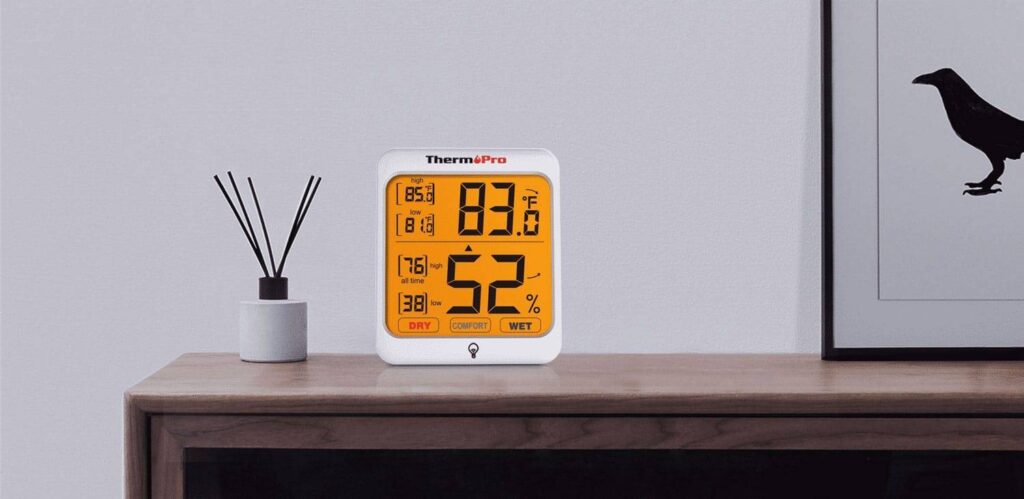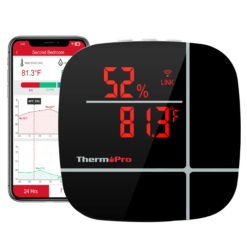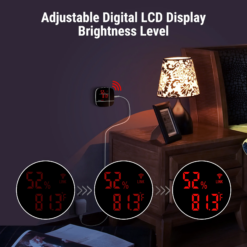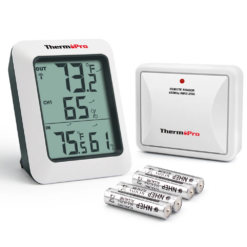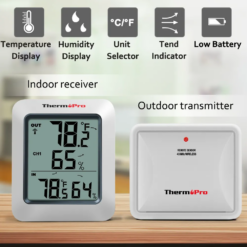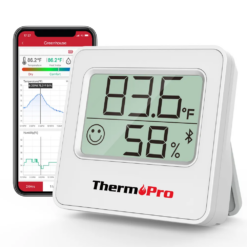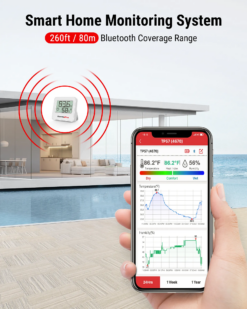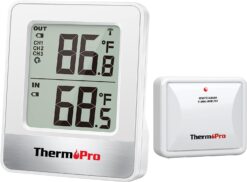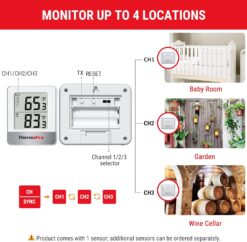Data centers are the backbone of modern digital infrastructure, housing critical servers, storage systems, and network equipment. These facilities require precise environmental control to ensure optimal performance, prevent hardware failures, and safeguard data integrity. While temperature control is often the first focus, humidity control is equally vital to the longevity and efficiency of equipment. Hygrometers, devices used to measure and monitor humidity levels, are indispensable tools for maintaining proper environmental conditions in data centers.
In Kenya, the growing number of data centers supporting everything from cloud computing to telecommunications highlights the importance of maintaining stable conditions. Hygrometers ensure the correct balance of humidity is maintained, preventing issues such as static electricity, corrosion, and overheating, all of which can lead to costly downtime.
Why Humidity Control is Crucial in Data Centers
The delicate balance of humidity within a data center directly affects the operation and lifespan of electronic equipment. Ideal relative humidity levels range between 40% and 60%. Deviating from this range can lead to various issues:
- Low Humidity (Below 40%):
- Static Electricity: When humidity levels drop too low, static electricity builds up. This is particularly dangerous in data centers where static discharges can damage sensitive components like CPUs, memory chips, and hard drives. Even a small discharge can cause irreversible damage to server components, leading to costly repairs and downtime.
- High Humidity (Above 60%):
- Corrosion: Excess moisture in the air can lead to corrosion on the metal parts of servers and other electronic devices. Over time, this weakens components, increasing the risk of system failures.
- Condensation: Humidity that’s too high can also cause condensation to form on electronic components. When moisture builds up on sensitive hardware, it can lead to electrical shorts and failures, threatening the security and stability of critical data.
Maintaining the correct humidity levels with the help of reliable hygrometers is essential for ensuring that data centers remain operational without the risk of equipment damage or data loss.
Key Benefits of Using Hygrometers in Data Centers
1. Prevention of Static Electricity
Data centers typically generate large amounts of heat due to the constant operation of servers and other electronic equipment. As the air dries out due to cooling systems, static electricity buildup becomes a serious threat. Hygrometers ensure that the relative humidity never drops below the safe threshold, helping prevent static discharges that can damage sensitive components.
- ThermoPro TP90: This smart WiFi-enabled hygrometer is an ideal solution for large-scale data centers. With real-time humidity and temperature monitoring, data center managers can be alerted when levels drop, allowing them to adjust the humidity before static buildup occurs.
2. Corrosion Control
Servers and network equipment are vulnerable to corrosion if exposed to excessive moisture over extended periods. Hygrometers allow data center operators to maintain humidity levels within the recommended range, preventing the slow degradation of electronic components.
- ThermoPro TP60C: With its wireless sensors and long-range capabilities, the TP60C is perfect for monitoring humidity levels in different areas of a data center. This ensures that no section is at risk of excessive humidity, thereby protecting equipment from corrosion.
3. Protecting Against Condensation
Condensation can be a silent killer in data centers, causing short circuits and malfunctions. When the air becomes too humid, moisture can collect on servers and racks, increasing the risk of equipment failure. Hygrometers help maintain an environment where condensation cannot form, ensuring the safety of all electronic equipment.
- ThermoPro TP200B: With waterproof sensors and the ability to monitor both temperature and humidity, the TP200B is perfect for environments where condensation risk is high. Its accurate readings allow data center managers to make swift adjustments to prevent moisture buildup.
The Role of Hygrometers in Monitoring Humidity Zones
Data centers are often large and segmented, with different zones experiencing different environmental conditions. It’s essential to monitor multiple locations within the facility, especially in areas like server rooms, cooling zones, and equipment storage areas. Hygrometers can be deployed in various sections to provide accurate, real-time data on humidity levels across the entire facility.
- ThermoPro TP357: This Bluetooth-enabled smart hygrometer can transmit data to the ThermoPro Sensor App, making it easy for data center operators to monitor different zones within the facility from a single platform. Historical data tracking allows them to identify trends and make necessary adjustments over time.
Integration of Hygrometers into Data Center Management Systems
Hygrometers can be integrated into larger building management systems (BMS) or data center infrastructure management (DCIM) platforms. By combining hygrometer data with other environmental controls like temperature sensors and cooling systems, operators can maintain optimal conditions for both humidity and temperature.
- ThermoPro TP90: With WiFi connectivity, the TP90 is ideal for integration into larger systems, allowing for seamless data flow between humidity monitoring and the overall climate control mechanisms within the data center.
Compliance with Industry Standards
In addition to protecting equipment, data centers in Kenya must often comply with international standards for humidity control. For instance, the American Society of Heating, Refrigerating and Air-Conditioning Engineers (ASHRAE) recommends maintaining humidity levels between 40% and 60% for optimal performance. Hygrometers help ensure that these standards are consistently met, allowing data centers to operate efficiently while staying compliant with best practices.
Cost Savings through Preventative Maintenance
Hygrometers provide a simple yet highly effective way to prevent costly equipment failures. By continuously monitoring humidity levels, operators can make necessary adjustments before conditions reach a critical point. This form of preventive maintenance helps avoid:
- Downtime: Unplanned outages due to humidity-related equipment failure can result in significant revenue loss for businesses relying on data center services.
- Repair and Replacement Costs: Equipment damaged by improper humidity conditions requires expensive repairs or replacement. Regular monitoring prevents such damage from occurring in the first place.
Conclusion: The Essential Role of Hygrometers in Kenya’s Data Centers
As Kenya’s digital economy grows, the need for reliable and efficient data centers is more important than ever. Hygrometers play a critical role in maintaining the delicate balance of humidity, preventing static electricity, corrosion, and condensation, all of which can compromise the integrity of data centers.
Whether it’s through the ThermoPro TP90 for large-scale facilities or the ThermoPro TP357 for monitoring individual zones, implementing hygrometers is a cost-effective way to ensure data center equipment remains safe and operational. In an industry where downtime is unacceptable and equipment failure can be disastrous, hygrometers are an essential investment for long-term stability and success.The Importance of Hygrometers in Kenya’s Data Centers
Data centers are the backbone of modern digital infrastructure, housing critical servers, storage systems, and network equipment. These facilities require precise environmental control to ensure optimal performance, prevent hardware failures, and safeguard data integrity. While temperature control is often the first focus, humidity control is equally vital to the longevity and efficiency of equipment. Hygrometers, devices used to measure and monitor humidity levels, are indispensable tools for maintaining proper environmental conditions in data centers.
In Kenya, the growing number of data centers supporting everything from cloud computing to telecommunications highlights the importance of maintaining stable conditions. Hygrometers ensure the correct balance of humidity is maintained, preventing issues such as static electricity, corrosion, and overheating, all of which can lead to costly downtime.
Why Humidity Control is Crucial in Data Centers
The delicate balance of humidity within a data center directly affects the operation and lifespan of electronic equipment. Ideal relative humidity levels range between 40% and 60%. Deviating from this range can lead to various issues:
- Low Humidity (Below 40%):
- Static Electricity: When humidity levels drop too low, static electricity builds up. This is particularly dangerous in data centers where static discharges can damage sensitive components like CPUs, memory chips, and hard drives. Even a small discharge can cause irreversible damage to server components, leading to costly repairs and downtime.
- High Humidity (Above 60%):
- Corrosion: Excess moisture in the air can lead to corrosion on the metal parts of servers and other electronic devices. Over time, this weakens components, increasing the risk of system failures.
- Condensation: Humidity that’s too high can also cause condensation to form on electronic components. When moisture builds up on sensitive hardware, it can lead to electrical shorts and failures, threatening the security and stability of critical data.
Maintaining the correct humidity levels with the help of reliable hygrometers is essential for ensuring that data centers remain operational without the risk of equipment damage or data loss.
Key Benefits of Using Hygrometers in Data Centers
1. Prevention of Static Electricity
Data centers typically generate large amounts of heat due to the constant operation of servers and other electronic equipment. As the air dries out due to cooling systems, static electricity buildup becomes a serious threat. Hygrometers ensure that the relative humidity never drops below the safe threshold, helping prevent static discharges that can damage sensitive components.
- ThermoPro TP90: This smart WiFi-enabled hygrometer is an ideal solution for large-scale data centers. With real-time humidity and temperature monitoring, data center managers can be alerted when levels drop, allowing them to adjust the humidity before static buildup occurs.
2. Corrosion Control
Servers and network equipment are vulnerable to corrosion if exposed to excessive moisture over extended periods. Hygrometers allow data center operators to maintain humidity levels within the recommended range, preventing the slow degradation of electronic components.
- ThermoPro TP60C: With its wireless sensors and long-range capabilities, the TP60C is perfect for monitoring humidity levels in different areas of a data center. This ensures that no section is at risk of excessive humidity, thereby protecting equipment from corrosion.
3. Protecting Against Condensation
Condensation can be a silent killer in data centers, causing short circuits and malfunctions. When the air becomes too humid, moisture can collect on servers and racks, increasing the risk of equipment failure. Hygrometers help maintain an environment where condensation cannot form, ensuring the safety of all electronic equipment.
- ThermoPro TP200B: With waterproof sensors and the ability to monitor both temperature and humidity, the TP200B is perfect for environments where condensation risk is high. Its accurate readings allow data center managers to make swift adjustments to prevent moisture buildup.
The Role of Hygrometers in Monitoring Humidity Zones
Data centers are often large and segmented, with different zones experiencing different environmental conditions. It’s essential to monitor multiple locations within the facility, especially in areas like server rooms, cooling zones, and equipment storage areas. Hygrometers can be deployed in various sections to provide accurate, real-time data on humidity levels across the entire facility.
- ThermoPro TP357: This Bluetooth-enabled smart hygrometer can transmit data to the ThermoPro Sensor App, making it easy for data center operators to monitor different zones within the facility from a single platform. Historical data tracking allows them to identify trends and make necessary adjustments over time.
Integration of Hygrometers into Data Center Management Systems
Hygrometers can be integrated into larger building management systems (BMS) or data center infrastructure management (DCIM) platforms. By combining hygrometer data with other environmental controls like temperature sensors and cooling systems, operators can maintain optimal conditions for both humidity and temperature.
- ThermoPro TP90: With WiFi connectivity, the TP90 is ideal for integration into larger systems, allowing for seamless data flow between humidity monitoring and the overall climate control mechanisms within the data center.
Compliance with Industry Standards
In addition to protecting equipment, data centers in Kenya must often comply with international standards for humidity control. For instance, the American Society of Heating, Refrigerating and Air-Conditioning Engineers (ASHRAE) recommends maintaining humidity levels between 40% and 60% for optimal performance. Hygrometers help ensure that these standards are consistently met, allowing data centers to operate efficiently while staying compliant with best practices.
Cost Savings through Preventative Maintenance
Hygrometers provide a simple yet highly effective way to prevent costly equipment failures. By continuously monitoring humidity levels, operators can make necessary adjustments before conditions reach a critical point. This form of preventive maintenance helps avoid:
- Downtime: Unplanned outages due to humidity-related equipment failure can result in significant revenue loss for businesses relying on data center services.
- Repair and Replacement Costs: Equipment damaged by improper humidity conditions requires expensive repairs or replacement. Regular monitoring prevents such damage from occurring in the first place.
As Kenya’s digital economy grows, the need for reliable and efficient data centers is more important than ever. Hygrometers play a critical role in maintaining the delicate balance of humidity, preventing static electricity, corrosion, and condensation, all of which can compromise the integrity of data centers.
Whether it’s through the ThermoPro TP90 for large-scale facilities or the ThermoPro TP357 for monitoring individual zones, implementing hygrometers is a cost-effective way to ensure data center equipment remains safe and operational. In an industry where downtime is unacceptable and equipment failure can be disastrous, hygrometers are an essential investment for long-term stability and success.

